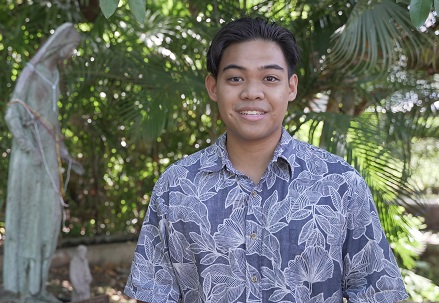The Chaminade University Hogan Entrepreneurial Program officially kicked off its 2020-2021 school year on October 14, 2020.
The program held a virtual kickoff celebration for Chaminade leaders, faculty and staff; current Hogan students and alumni; and Hogan advisors, mentors and lecturers. As part of the celebration, the Hogan Entrepreneurial Program and American Savings Bank also announced the winners of their 2020 Nonprofit Business Plan Competition.
The Hogan Entrepreneurial Program at Chaminade University is a one- or two-year program for Chaminade students to learn successful entrepreneurial skills. Students participate in weekly lectures with guest speakers, network with Hawaii’s top business leaders and learn how to turn a business idea into a successful startup.
This year’s program seems incredibly timely as businesses across the state struggle with the economic impacts of COVID-19 restrictions. Some experts estimate that Hawaii’s economy will be one of the hardest hit. With the summer tourism season essentially canceled, Hawaii saw an unemployment rate of 23.5 percent—more than 10 percent higher than the national average. And while the islands are slowly beginning to reopen to visitors, one study recently named Hawaii as the worst state for unemployment recovery.
These struggles provided an opportunity for business leaders to pass down timely advice to this year’s Hogan participants.

“For the students out there: keep the faith,” said Gary Hogan, Chief Executive Officer of Hawaiian Hotels & Resorts and President of Royal Pacific Air Charters, Pleasant Aircraft Leasing LLC. “Things are going to get better. It’s going to take a while, but we will all get back together as a family again.”
Hogan continued by encouraging students to remain flexible because as this year has shown, you never know what is going to happen next.
“You can see things can change in an instance,” advised Hogan. “What you think is going to be successful and what you have planned may not be. Things change.”
Both Hogan and Dr. Lynn Babington, President of Chaminade University, pointed out that there will be a lot of good case studies for the students to learn from this year as businesses pivoted to adapt.
“We are in a time of opportunity to continue learning and creating new and interesting and dynamic changes as things move forward,” said Dr. Babington. “It’s a great time to be in the entrepreneurial space.”

Richard Wacker, the President and Chief Executive Officer of American Savings Bank, used the tourism industry struggles to highlight the importance of programs like Hogan, and to motivate the students to get creative and innovate.
“We know that our economy today is too dependent on the hospitality sector,” said Wacker. “It’s a wonderful business and it’s a great strength of Hawaii…but we have to be more than that. We have to be more diverse and resilient. The way we get there is through entrepreneurship and innovation.”
Wacker sees an opportunity for Hawaii to lead innovation in areas like clean energy, ocean studies, sustainable agriculture and digital media. But, he says, in order for businesses to succeed in Hawaii, we have to be all in.
“Doing business in Hawaii is not a spectator sport,” said Wacker. “We don’t have enough leadership, we don’t have enough businesses to have anybody on the sideline. Succeeding for the state, in our state, requires everyone to be in the game.”
The finalists of this year’s Nonprofit Business Plan Competition were a great example of Hawaii community members coming together to innovate and make Hawaii a stronger, more resilient community.
Forty organizations submitted proposals for new programs that would benefit society, eight were selected as finalists and presented their ideas to a panel of judges and four were announced as winners at the October 14 event.

The first place prize of $12,000 went to the Institute for Human Services for a new program that will offer medically-monitored and clinically-managed high-intensity residential substance abuse detox services. It will be the first program of its kind in Hawaii.
The second place prize of $10,000 was presented to Family Hui Hawaii for their new pilot Hui in the Workplace program. The initiative offers corporations a 12-week peer-led program for employees that explore the joys and challenges of raising young children. The program has been proven to help enhance employee retention and productivity and support a culture of caring and wellness in the workplace.
Other winners included the Assistive Technology Resource Centers of Hawaii for their new program, The Music Club, that creates a safe space for individuals with disabilities to make music, and the Maui Nui Marine Resource Council for their pilot program that uses oysters to address sediment pollution on coral reefs.
“We learned so many things about the diligent efforts of quality entrepreneurs from all over our islands,” said Roy Panzarella, Director of the Hogan Entrepreneurial Program when introducing this year’s competition. “This competition, according to one of our judges, was one of the best to date.”









